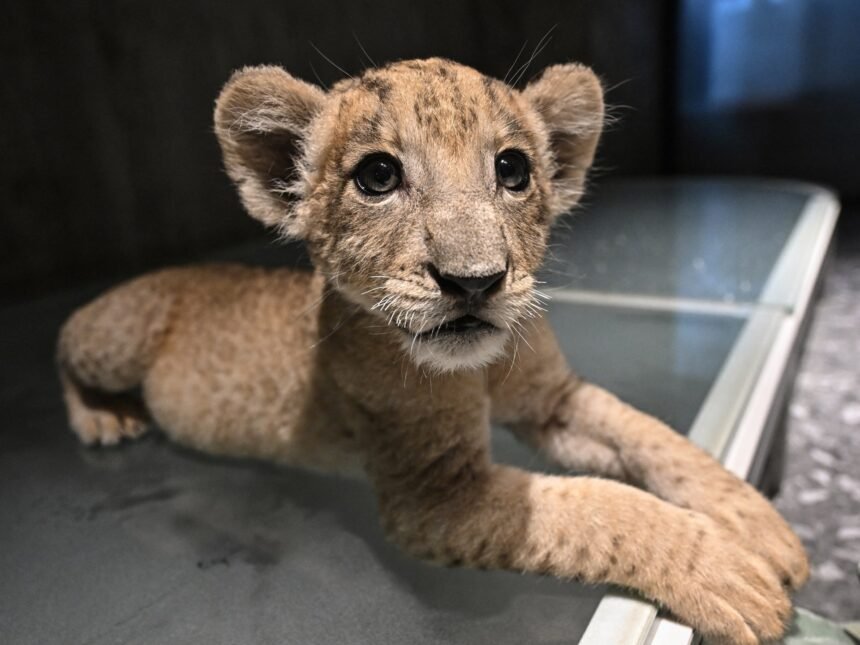Behind a automotive restore enterprise on an unremarkable Thai road are the cherished pets of a rising TikTok animal influencer: Two lions and a 200kg (440lb) lion-tiger hybrid known as “Massive George”.
Lion possession is authorized in Thailand, and Tharnuwarht Plengkemratch is an enthusiastic advocate, posting updates on his feline companions to almost three million followers.
“They’re playful and affectionate, identical to canine or cats,” he stated from inside their cage advanced at his house within the northern metropolis of Chiang Mai.
Thailand’s captive lion inhabitants has soared lately, with almost 500 registered in zoos, breeding farms, petting cafes and houses.
The increase is prompted by social media, the place house owners like Tharnuwarht put up lighthearted content material and glamour photographs with lions.
Since 2022, Thai legislation has required house owners to register and microchip lions, and inform authorities earlier than shifting them.
However there aren’t any breeding caps, few enclosure or welfare necessities, and no controls on liger or tigon hybrids.

Tom Taylor, chief working officer of conservation group Wildlife Associates Basis Thailand, and his colleagues have tracked the rise in lion possession with on-site visits and by trawling social media.
They recorded about 130 in 2018, and almost 450 by 2024. However almost 350 extra lions they encountered have been “misplaced to follow-up” after their whereabouts couldn’t be confirmed for a yr.
That might point out unreported deaths, an animal faraway from show or “worst-case eventualities”, stated Taylor. “Now we have interviewed merchants (within the area) who’ve given us costs for reside and useless lions and have advised us they will take them over the border.”
As a weak species, lions and their components can solely be bought internationally with Conference on Worldwide Commerce in Endangered Species of Wild Fauna and Flora (CITES) permits.
Media experiences and social media have documented lions, together with cubs, in Cambodia a number of occasions lately, although CITES exhibits no registered imports since 2003.
There’s additionally rising proof that captive lion numbers in Laos exceed CITES import licences.
In Thailand, in the meantime, imports of lion components like bones, skins and tooth have dropped lately, although demand stays, elevating questions on how components are actually being sourced.
Thai dealer Pathamawadee Janpithak began within the crocodile enterprise, however pivoted to lions as costs for the reptiles declined. She sells one-month-olds for about 500,000 baht ($15,395), down from a peak of 800,000 baht ($24,638) as breeding operations like hers enhance provide.
Pathamawadee’s three amenities home about 80 lions, from a stately full-maned nine-year-old to a sickly pair of eight-day-olds being bottle-fed across the clock.
He sells about half of the 90 cubs she breeds every year, usually to different breeders, who’re more and more opening “lion cafes” the place prospects pose with and pet younger lions.

The rising lion inhabitants is an issue for Thailand’s Division of Nationwide Parks, Wildlife and Plant Conservation (DNP), admitted wildlife safety director Sadudee Punpugdee.
“However personal possession has existed for a very long time… So we’re taking a gradual method,” he stated.
That features limiting lion imports so breeders are pressured to depend on the home inhabitants.
Already stretched authorities face tough selections on implementing rules, as confiscated animals turn out to be their duty, stated Penthai Siriwat, unlawful wildlife commerce specialist at WWF Thailand.
“There’s a substantial amount of deliberation earlier than intervening … contemplating the substantial prices,” stated Siriwat. Homeowners like Tharnuwarht usually invoke conservation to justify their pets, however Thailand’s captive lions won’t ever reside within the wild.
Sanctuary chief vet Natanon Panpeth treads fastidiously whereas discussing the lion commerce, warning solely that the “wellbeing of the animals ought to at all times come first”.
Sadudee is hopeful some provisions could also be tightened, although a ban is unlikely for now. He has his recommendation for would-be house owners: “Wild animals belong within the wild.
“There are many different animals we are able to hold as pets.”
